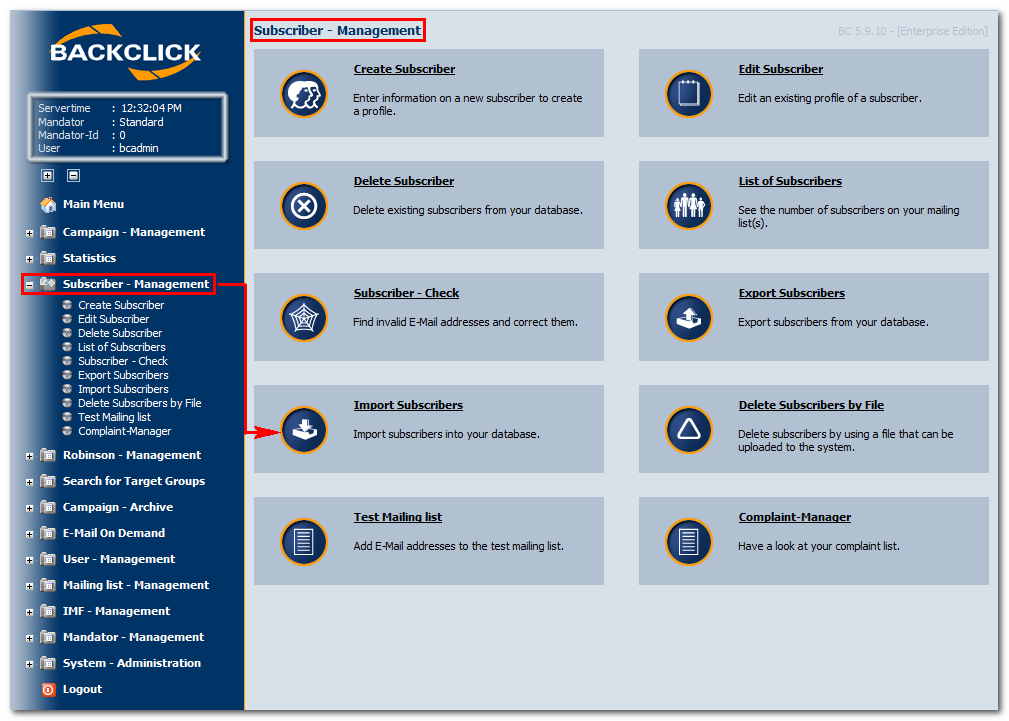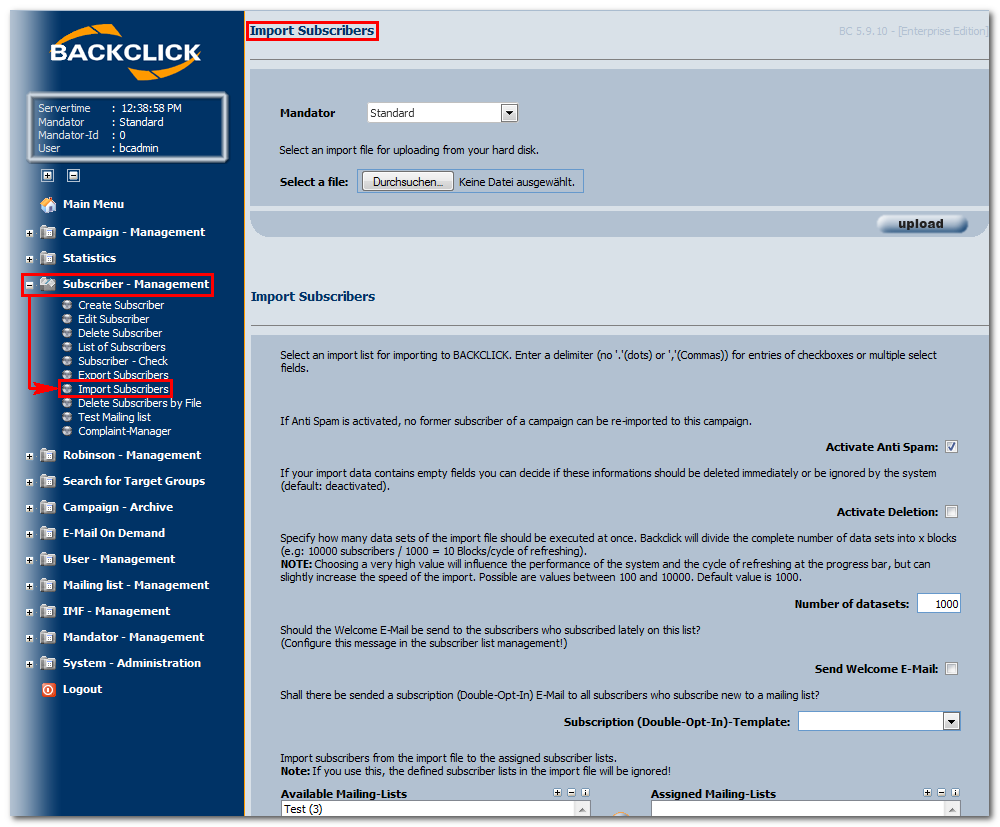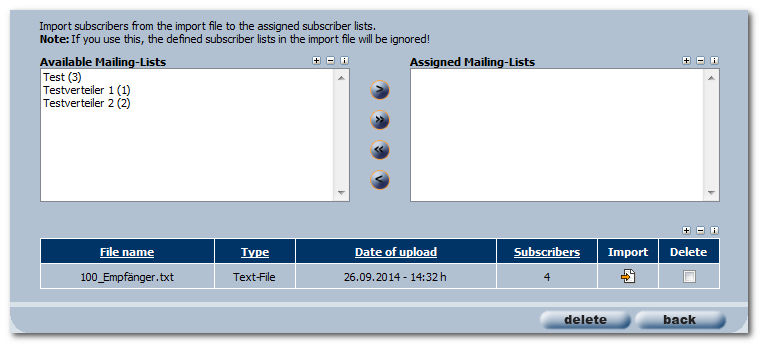If you already have address or contact information about your subscribers and/or customers, it is possible to import these information into BACKCLICKs database in order to personalize your newsletters.
Fig.. 3.4 - Subscriber - Management
In order to import your existing data (i.e., customer base) into BACKCLICK you have to convert your data to an ASCII-file. The file has to be arranged in a way that every subscriber dataset has its own line. Datafields have to be separated with a tab. Provide the data field names (such as TITLE, LASTNAME) in capital letters as the first line of your file, seperated by tabs as well. This import file defines which mailing list(s) each subscriber is added to as well. That is the purpose of the fieldname "NEWSLETTER" which HAS to be the last column!
The import is based on the data fields of your subscriber's database you have built using the database designer. You may define data fields for the master data of your subscriber (e.g., NAME, ADDRESS), for the social demographic data of your subscriber (e.g. AGE, MARITALSTATUS) etc.. The names of the data fields in your subscriber database are called field names. It is only possible to use existing field names in your import file. This also applies to mailing list IDs: You are only able to add subscribers to existing mailing lists.
PLEASE NOTE: EMAIL and NEWSLETTER are mandatory fields, and have to be written in capital letters, like all other field names. In order to create your file you can use Microsoft Excel for example. As shown in the figure, the field names are provided as the first line of the file, followed by values for the corresponding fields. If you want to define more than one value for a field name, please use a delimiter like “;” or “-”. Do not use dots or commas, doing so may cause a system error. Save the import file in Excel as “Text (tab separated)” with your desired name.
Click “Subscriber - Management” in your Main Menu, and choose “Import Subscribers” in the submenu. Use the “Search” button to search for the file on your computer. Clicking the "OK" button will display the file in the list of import files.
Fig. 3.4.1 - Import Subscribers
If you want to start importing your file, please click the “Import” button in the corresponding column of the table (see Fig. 3.4.2). You will see the progress of your import in a separate browser window. At the same time you will get information about invalid subscribers, mere updates (subscriber was present in the system before) and new subscribers.
The following additional features are available while importing:
Anti-SPAM:
When activating the feature Anti-SPAM, no subscriber who unsubscribed from a mailing list can be added to the mailing list he unsubscribed from when importing. BACKCLICK registers all unsubscriptions in a database. This way, even in case of complete loss of an E-Mail address in the database, BACKCLICK will still be able to refer to the unsubscription and consider this when re-importing.
Activate Deletion
This feature rules the way BACKCLICK deals with E-Mail addresses already present in the system. If there are empty fields within a dataset in your import file this feature decides whether empty fields delete existing subscriber information of existing subscriber datasets or are ignored (information in the subscriber database will NOT be overwritten by default). In this case the import is additive. Information not present yet will be added to the dataset.
Number of datasets
Specify how many datasets of the import file are supposed to be executed at the same time. BACKCLICK splits the total number of subscribers to be imported into x blocks (e.g. 10,000 subscribers/1,000 = 10 blocks/execution cycles).
NOTE: If the value chosen is too high, system stability and refresh rate of the progress indicator are affected, but the speed of your import may be increased. Possible values are between 100 and 10,000. Default is 1,000.
Fig. 3.4.2 - Import Subscribers
Send welcome E-Mail
You can activate the automatic dispatch of a welcome E-Mail to those subscribers that subscribed to a new mailing list after your import. This welcome E-Mail is already configured in your mailing list management.
Mailing lists
The subscribers of the import file can subscribe to the lists shown. NOTE: If you choose a mailing list here, the corresponding values in your import file will be ignored! The data field NEWSLETTER does not have to exist in your import file.
All files ready for import will be shown in a table at the end of these setting possibilities. To start the import, please click the "Import" button. You will see the following information in a separate browser window:
The amount of subscribers imported into the system will be shown, along with whether or not the import was successful. Clicking the statistics symbol () will open a separate browser window with the textual version of the import analysis:
Description of the analysis:
- Name of import list: Name of the list you just imported.
- Number of subscribers: Total number of subscribers present on the list you just imported.
- Invalid: Number of invalid subscribers/E-Mail addresses (0 out of 4 of the imported subscribers in the example shown above).
- Double: Number of duplicate subscribers/E-Mail addresses (0 out of 4 of the imported subscribers in the example shown above).
- Robinson blocked: Number of blocked subscribers/E-Mail addresses. These E-Mail addresses are present on the Robinson list and cannot be imported because the owners of these E-Mail addresses have explicitly disagreed to the use (0 out of 4 of the imported subscribers in the example shown above).
- Antispam blocked: If the feature Anit-SPAM is activated, no subscriber who unsubscribed from a newsletter can be added to this newsletter again using the import routine (0 out of 4 of the imported subscribers in the example shown above).
- MX-Lookup blocked: The import routine can start an MX-Lookup for every subscriber to be imported, in order to check whether or not the domain of the E-Mail address exists. This way invalid E-Mail addresses can be filtered while importing (0 out of 4 of the imported subscribers in the example shown above).
- Number of subscriber updates: Number of subscribers that are already present in the system. Importing these addresses again results in an automatic update of the existing data (4 out of 4 of the imported subscribers in the example shown above).
- Number of new subscribers: Number of subscribers imported into the system (0 out of 4 of the imported subscribers in the example shown above).
If you want to delete an import file from your table, mark the box in the column "delete". To confirm deletion click the "delete" button. The file will be removed from the list without further notice and cannot be imported without uploading it again. If you do not want to import anything click the "back" button to go back to Subscriber - Management.





